
INTERNATIONAL JOURNAL OF OSTEOARCHAEOLOGY
metrics 2024
Exploring Human History Through Bones
Introduction
Welcome to the INTERNATIONAL JOURNAL OF OSTEOARCHAEOLOGY, an esteemed publication in the fields of anthropology and archaeological science, published by Wiley. Established in 1991, this journal has consistently provided a platform for groundbreaking research, with its scope encompassing the study of human remains in archaeological contexts. Boasting an impressive impact factor and ranking in the top quartile (Q1) for Anthropology and Archaeology, the journal stands at the forefront of academic discourse, particularly in the arts and humanities. With Scopus rankings placing it within the 88th percentile in Archeology and the 81st percentile in Anthropology, it serves as a vital resource for researchers, professionals, and students alike. Though currently not offering Open Access, the journal remains committed to disseminating high-quality research that contributes significantly to our understanding of past societies through the careful study of osteological remains. Explore our extensive archives and join a community of scholars dedicated to advancing knowledge in osteoarchaeology.
Metrics 2024
 0.56
0.56 1.10
1.10 1.30
1.30 70
70Metrics History
Rank 2024
Scopus
IF (Web Of Science)
JCI (Web Of Science)
Quartile History
Similar Journals
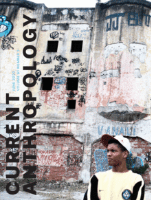
CURRENT ANTHROPOLOGY
Exploring Cultures Through Rigorous ResearchCURRENT ANTHROPOLOGY, published by the esteemed University of Chicago Press, stands as a premier journal in the fields of anthropology and archaeology, with an impressive impact factor that signifies its relevance and authority in the academic community. With both print (ISSN: 0011-3204) and digital formats (E-ISSN: 1537-5382), this journal provides a platform for groundbreaking research, theoretical advancements, and critical discussions that shape our understanding of human cultures and societies. Since its inception in 1962, CURRENT ANTHROPOLOGY has continually pushed the boundaries of knowledge and inquiry, earning a prestigious Q1 ranking in 2023 across multiple categories, including Social Sciences and Archaeology. Researchers and professionals alike rely on this journal not only for its rigorous peer-reviewed articles but also for its commitment to interdisciplinary approaches and innovative methodologies. While not currently offering open access, CURRENT ANTHROPOLOGY remains an essential resource for students and scholars eager to stay abreast of the latest developments in anthropological research.

VEGETATION HISTORY AND ARCHAEOBOTANY
Charting the Course of Vegetation Through Human HistoryVegetation History and Archaeobotany is an esteemed academic journal published by Springer, dedicated to the exploration of the interactions between vegetation, human activity, and the archaeological record. With its history spanning from 1992 to 2024, the journal has established a significant presence in the academic community, particularly with its strong impact reflected in its Q1 rankings across diverse fields such as Archaeology, Paleontology, and Plant Science. The journal consistently ranks among the top publications, achieving remarkable positions such as 12th in Archeology and 9th in Paleontology according to Scopus, which underscores its influence and quality in the field. Aimed at researchers, professionals, and students alike, Vegetation History and Archaeobotany serves as a crucial resource for those seeking to understand the pivotal role of plant remains in reconstructing past environments and human interactions. Readers can expect to find rigorously reviewed articles that contribute to the ongoing discourse in vegetation studies and archaeological science.

ARCHAEOFAUNA
Connecting Species and Societies Across TimeARCHAEOFAUNA, published by the Laboratorio Arqueozoologia, Departamento de Biología, is a distinguished journal based in Spain dedicated to advancing the field of archaeozoology. With an ISSN of 1132-6891, this journal offers valuable insights into the relationship between ancient societies and their animal populations, making it an essential resource for researchers and professionals in the fields of archaeology, animal science, and zoology. As of 2023, ARCHAEOFAUNA is categorized in the second quartile (Q2) for both Archaeology and Archaeology (Arts and Humanities), indicating its significance in the academic landscape, while also occupying the third quartile (Q3) in Animal Science and Zoology. The journal spans comprehensive years of publication from 1996 to 2007 and continues its contributions through 2024. Despite its open access status being unspecified, the quality and rigor of research presented in ARCHAEOFAUNA underscores its commitment to disseminating knowledge that fosters a deeper understanding of historical ecology. Researchers, students, and professionals alike will find ARCHAEOFAUNA to be an invaluable asset in exploring the intricate ties between humanity and the animal kingdom throughout history.
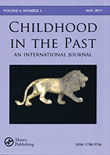
Childhood in the Past
Bridging disciplines to uncover the essence of childhood in the past.Childhood in the Past is a pivotal academic journal published by Taylor & Francis Ltd, dedicated to exploring the historical perspectives of childhood through a multidisciplinary lens. With an ISSN of 1758-5716 and E-ISSN 2040-8528, this esteemed journal analyzes and contextualizes childhood across various cultures and eras, significantly contributing to the fields of Anthropology and Life-span and Life-course Studies. Despite the absence of Open Access options, the journal holds an impressive Q2 ranking in Anthropology and a Q4 ranking in Life-span and Life-course Studies, reflecting its valuable scholarly contributions. Researchers and students alike can benefit from its insights, given its Scopus rankings — placing it in the 51st percentile for Anthropology and 18th percentile for Life-span studies. Published in the United Kingdom and facilitating an engaging dialogue on childhood history, Childhood in the Past continues its quest from 2014 to 2024 to deepen the understanding of how childhood has shaped societies and continues to evolve today.

Chungara-Revista de Antropologia Chilena
Advancing Knowledge in Chilean EthnographyChungara-Revista de Antropologia Chilena is a premier academic journal dedicated to the field of anthropology, showcasing research and discourse that emphasize the rich cultural heritage of Chile and its surrounding regions. Published by UNIV TARAPACA, this journal serves as a vital platform for scholars, researchers, and students keen on exploring anthropological studies, ethnographic fieldwork, and cultural analysis. With an ISSN of 0717-7356, it adheres to rigorous academic standards and strives to promote open dialogue on contemporary and historical issues across various communities. Although currently not indexed in prominent metrics, its commitment to scholarly excellence contributes significantly to the academic landscape, fostering a deeper understanding of anthropological practices in Chile and beyond. Authors are encouraged to engage with the journal's rich repository of knowledge while readers gain access to pivotal insights that drive forward the discourse within anthropology.
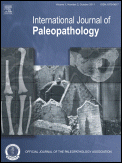
International Journal of Paleopathology
Advancing Knowledge of Past Diseases and Their ImpactThe International Journal of Paleopathology, published by Elsevier Science Inc, serves as a leading scholarly platform dedicated to the study of ancient diseases and their effects on human populations throughout history. Since its inception in 2011, this journal has garnered a prestigious reputation in the field, earning a 2023 Q1 ranking in Archeology and a Q2 ranking in Pathology and Forensic Medicine, attesting to its rigorous peer-review process and high-quality research output. With an impressive Scopus ranking of 38th out of 413 in Archeology and 98th out of 208 in Pathology and Forensic Medicine, the journal is positioned within the top percentile of its categories, reflecting its significant contribution to the advancement of knowledge in these disciplines. While the journal is not open access, it offers invaluable insights into the interactions of health, disease, and societal changes over time, making it an essential resource for researchers, professionals, and students looking to explore the intricate connections between past populations and their health.

Relaciones
Exploring Humanity, One Relationship at a Time.Relaciones is a prestigious open-access journal published by the SOC ARGENTINA ANTROPOLOGIA, dedicated to the field of anthropology. Since its inception in 1937, this journal has served as a vital platform for disseminating innovative research and insights within the social sciences community. With both its print (ISSN: 0325-2221) and online (E-ISSN: 1852-1479) formats, Relaciones ensures widespread accessibility, empowering researchers, professionals, and students to engage with contemporary anthropological discourse. The journal aims to foster critical discussions that not only reflect on cultural and societal issues but also contribute to theoretical advancements in anthropological methodologies. By maintaining a commitment to quality and open access, Relaciones plays a crucial role in shaping the future of anthropology in Argentina and beyond, encouraging scholarly collaboration and enriching the academic landscape.

Journal of Egyptian History
Exploring the Depths of Egypt's Rich History.The Journal of Egyptian History, published by BRILL, stands at the forefront of scholarly exploration in the vibrant field of Egyptian historical studies. Established to enhance our understanding of Egypt's rich historical landscape, this journal is recognized for its substantial contribution to the historiography of ancient and modern Egypt, evidenced by its impressive Q2 ranking in the history category, as well as a significant Scopus rank of 379 out of 1760, placing it in the 78th percentile. With an ISSN of 1874-1657 and an E-ISSN of 1874-1665, this journal publishes peer-reviewed articles that encompass archaeological findings, cultural analyses, and interdisciplinary approaches that are essential for scholars, professionals, and students alike. Although it operates under a subscription model, researchers can access a wealth of knowledge through its dynamic publications that span various periods, particularly focusing on converged years from 2008, 2010 to 2019, and 2021 to 2024. Located in Leiden, Netherlands, the Journal of Egyptian History is a pivotal resource for those dedicated to advancing the study of Egypt's past within the broader context of global history.
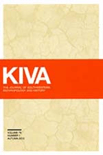
Kiva-Journal of Southwestern Anthropology and History
Celebrating the Legacy of Southwestern CulturesKiva - Journal of Southwestern Anthropology and History is a distinguished academic journal published by Routledge Journals, Taylor & Francis Ltd, that serves as a vital resource for scholars in the fields of anthropology, archaeology, and history. With an ISSN of 0023-1940 and an E-ISSN of 2051-6177, this journal has established itself as a significant avenue for scholarly communication since its inception in 1964. It consistently ranks in the top quartiles, including Q1 in Archaeology and Q2 in Anthropology, reflecting its high impact and rigorous peer-review process. Covering a wide array of topics pertinent to the Southwestern United States, Kiva invites original research articles, reviews, and methodological papers that advance understanding of the region's rich cultural heritage and historical narratives. While currently not open access, its commitment to disseminating quality research makes it an essential reading for researchers, professionals, and students aiming to explore the multifaceted dimensions of southwestern studies.
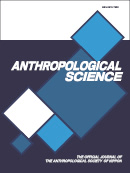
ANTHROPOLOGICAL SCIENCE
Exploring the diverse tapestry of human cultures and behaviors.ANTHROPOLOGICAL SCIENCE is a prominent journal in the field of anthropology, published by the Anthropological Society of Nippon since 1993. With a rich pedigree of scholarly contributions, this journal is an essential platform for disseminating research findings and theoretical discussions that push the boundaries of anthropological knowledge. Currently ranked in the Q3 category in Anthropology by 2023 metrics, ANTHROPOLOGICAL SCIENCE boasts an impressive position at #163 out of 502 in Scopus, placing it in the 67th percentile among its peers. While it operates under a traditional access model, the journal supports a diverse range of anthropological research encompassing cultural, biological, and archaeological perspectives. Researchers, professionals, and students will find valuable insights and innovative methodologies that foster a richer understanding of human societies and behaviors. The current trends and findings published in this journal make it a crucial resource for those involved in anthropological studies or related fields.